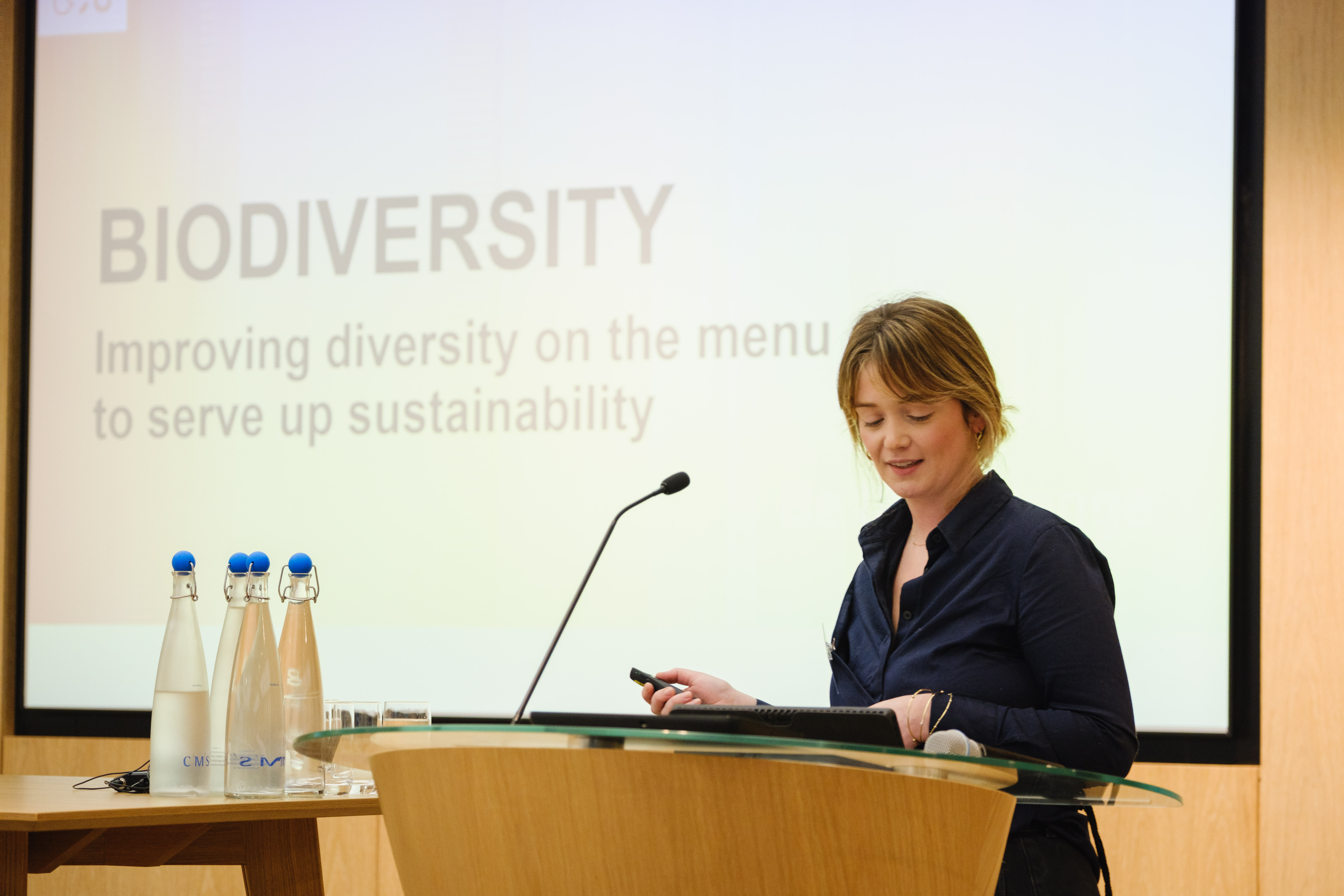We believe that sustainability should always be on the menu.
The food system as we know it is broken (Lang, 2020; Hawkes, 2018; Nestle 2020; Clapp 2020), it accounts for 25-33% of the world’s global carbon footprint (Poore & Nemechek, 2019; Crippa, 2021) the agricultural industry has one of the highest rates of modern-slavery (ILO, 2022) and food packaging is the world’s largest source of plastic pollution (OECD, 2022).
At Gather & Gather we take sustainability seriously and have worked hard to introduce a holistic approach to the food & drink we serve at University College London encompassing strategies to reduce our environmental, social, and economic impacts.
Read on to discover how we are reducing our impacts and innovating to create a future-focussed food offer on campus.
Our goal is to ensure that sustainability is always on the menu.
Here are some of the actions we take to achieve this.
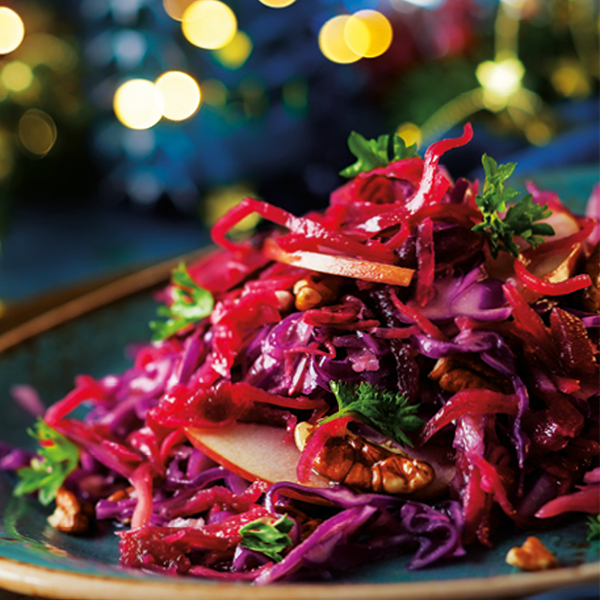
We are #PoweredByPlants
As a rule of thumb, dishes that celebrate fruit, vegetables, pulses, and grains have a lower environmental impact than those which use dairy products and meat (Poore and Nemecek, 2018). In collaboration with UCL, our chefs have worked hard to shift the narrative on plant-based dishes, celebrating delicious diverse ingredients that help us to make substantial carbon savings.
At UCL, we ensure that our refectory menus & retail ranges consist of 50% or more vegetarian and vegan dishes, and 50% or less meat-based dishes. Whilst in our Hospitality department, we are vegan & vegetarian by default, with 99.98% deliveries in 2022 being vegetarian or vegan.
Vegetarian and vegan food is always offered at a cheaper price point than their meat counterpart, and Oat Milk is offered at the same price as dairy, we’ve used research by the World Research Institute to influence our menu design, always placing vegetarian or vegan dishes at the top of menus.
We go one step further, and track our sales of these categories, setting targets to increase the sales of our vegan and vegetarian products.
We Champion Fairtrade
Sustainable food discourse tends to concentrate on the environmental impacts of food production, however if we want to build a sustainable food system, we need to address the issue of inequality in the food industry (ISEAL, 2021).
We ensure that our procurement of chocolate, bananas, coffee, tea & sugar for food served on site is certified Fairtrade or better, thus allowing us to determine that those commodities were produced in an fair way. Our signature coffee blend, Circulo Coffee from Union is certified Fairtrade, and is grown in Peru by a Union of over 70 small-holder farms, it is then roasted in East London, and brewed for you here at UCL – grab a cup & sip sustainably.
We are actively involved in Fairtrade Fortnight, serving up tasty deals & special bakes to encourage the UCL community to support Fairtrade.
To learn more about why Fairtrade is so important, visit their website.
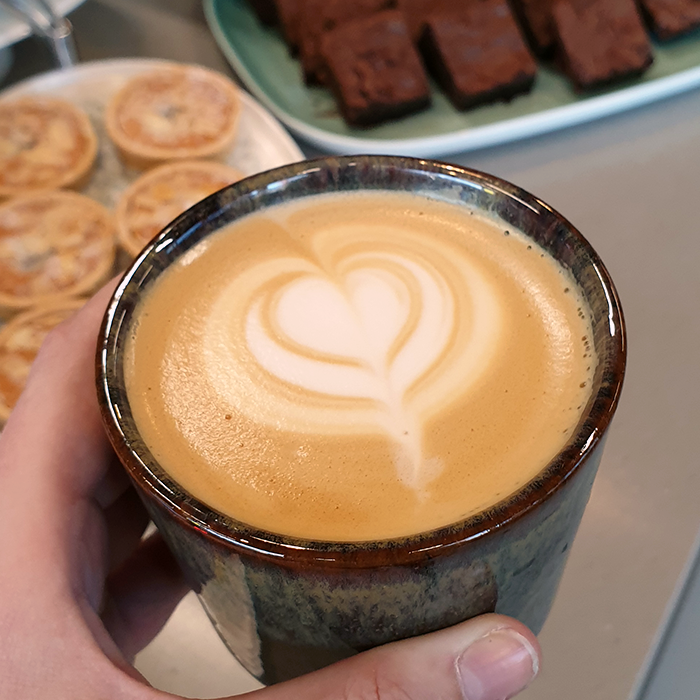
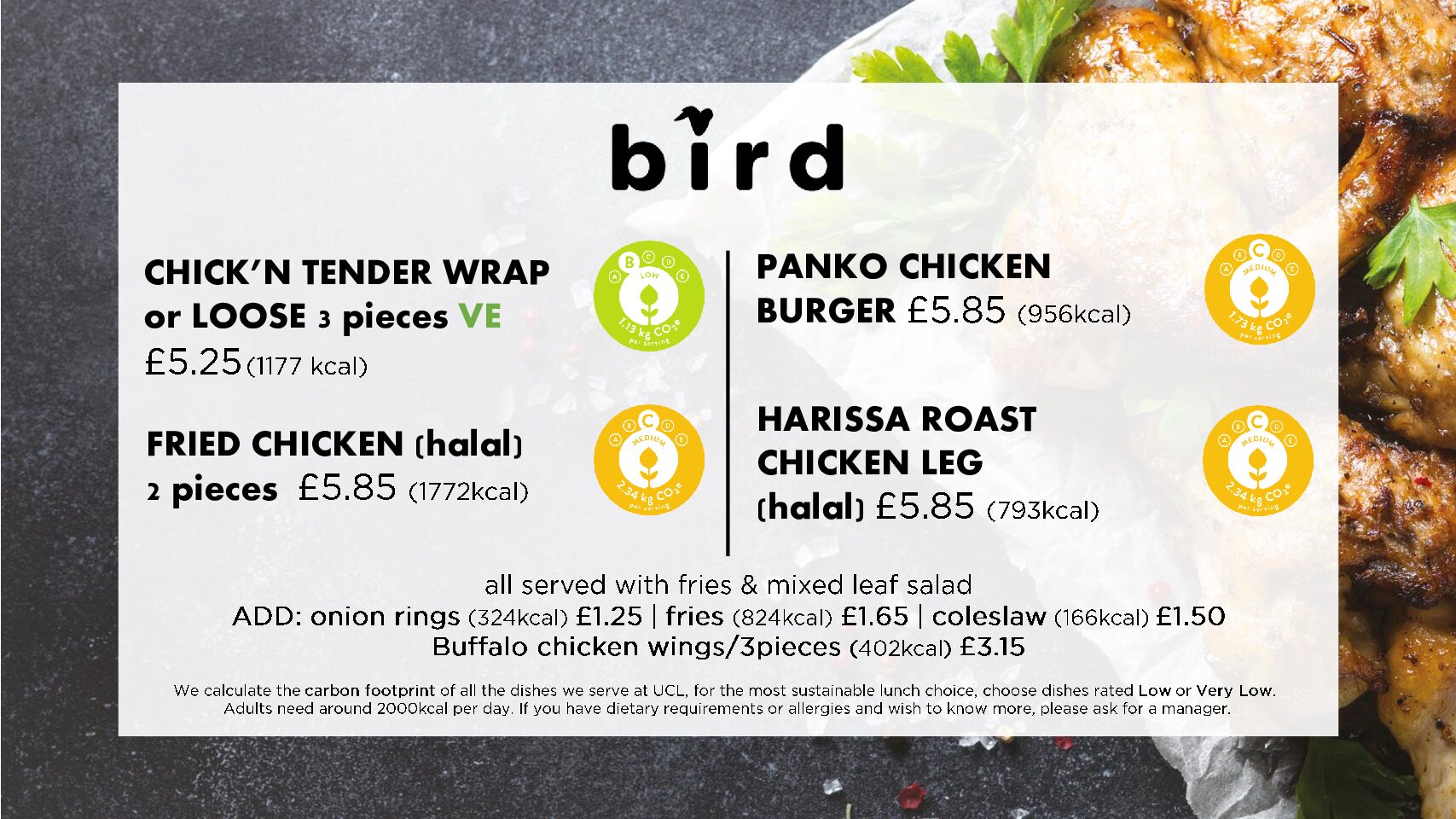
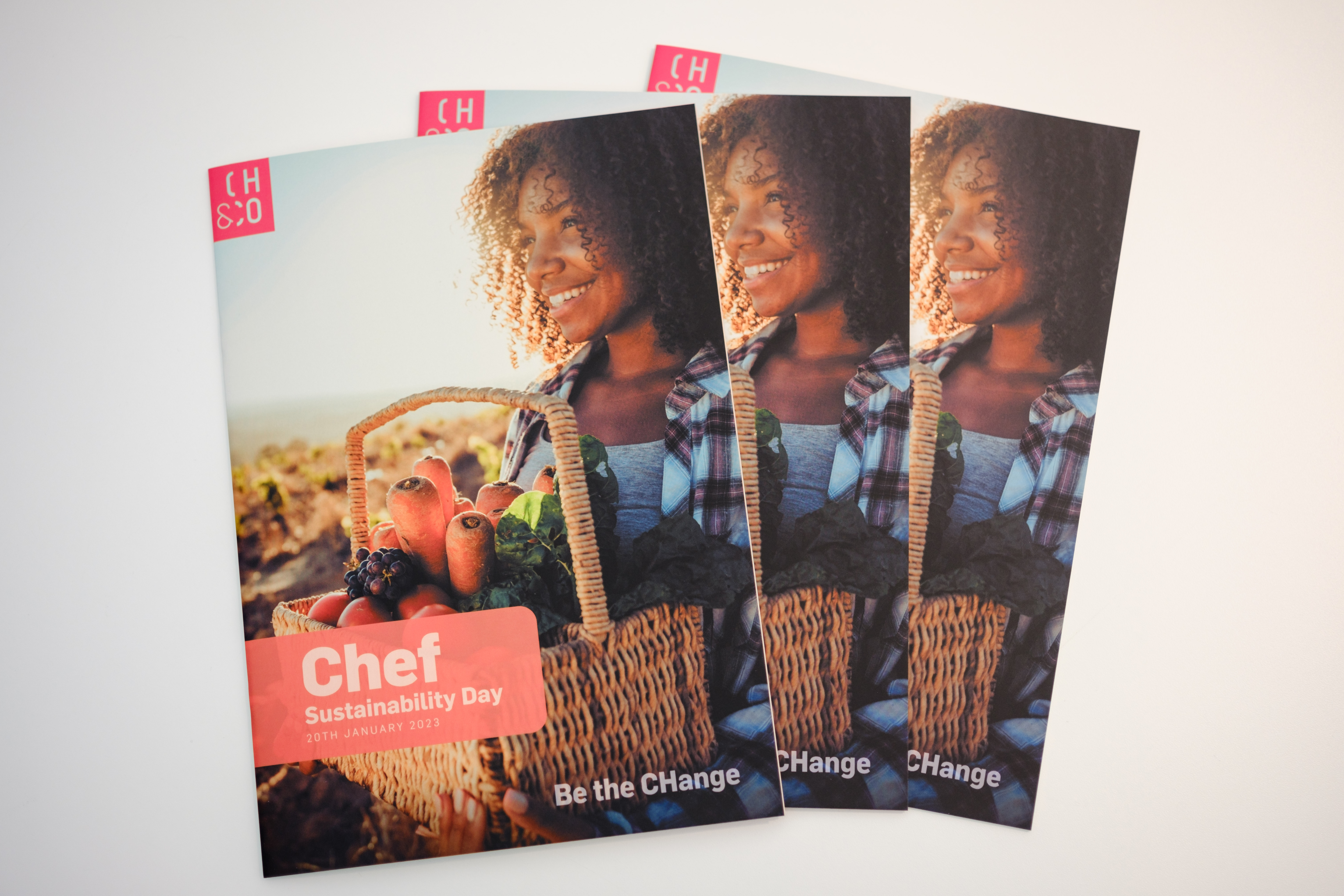
We Knowledge Share
Sustainable food literacy has been identified as a key measure to promote sustainable diet practices (Teng and Chih, 2022), in order to support the UCL community to make sustainable lunch choices, we calculate the carbon footprint of the food we cook in-house and display labels on our menus. 72% of the meals cooked on site in 2022 were rated as having a low or very low carbon footprint. To discover more about the carbon calculation system we use, visit FoodSteps.
You may also notice Future 50 signs in our refectories, our chefs have targets to include Future 50 ingredients in their dishes, these are 50 plant species identified as promoting biodiversity, having low carbon impact, and being nutritional powerhouses (WWF, 2019).
We work with Sustainable Food Ambassadors to spread the word about the climate impact of food and run communication campaigns to encourage sustainable eating.
We work closely with Sustainable UCL, tracking our environmental, social and economic impact on the UCL community. To find out more see our sustainability performance report for 2022.
Data sharing and transparent reporting are key to achieving climate goals (Wolrd Economic Forum, 2022), if you have any questions about the data we collect, or want to see up-to-date data contact Cicely
We Love Food & Hate Waste
1/3 of food that is produced globally every year is wasted (FAO, 2020), this is not only a human tragedy when there are people suffering from malnutrition, but also an environmental tragedy, if food waste was a country, it would be the third largest emitter of GHGe (WRAP 2021). This is an issue close to our business, in the U.K. 75% of the food thrown away in the hospitality sector is avoidable and edible (WRAP, 2022).
We work hard to produce delicious food on campus, and hate seeing it go to bins not bellies. That’s why we invest time & energy into measuring, reporting and reducing our food waste across campus.
We measure our prep, plate, over-production and spoilage food waste in order to capture granular detail on our food waste. Annual action plans are produced to reduce our food waste in line with Guardians of Grub toolkits.
All edible food waste is redistributed, either through donations to St Mungo’s or Life After Hummus, as discounted sales using our LOVEFOODHATEWASTE 30% offer, or through the Too Good To Go App.
All our food waste is recycled, either in our bio-digestor in the Wilkins Refectory, by going to Anaerobic Digestion, or in the case of our coffee beans, being turned into fuel, some of which runs London buses.
Download the Too Good To Go app and find it in the Student Centre (collection code: DSVFA957), Institute of Child Health (collection code: U7K3UPXG) and One Pool Street (no collection code).
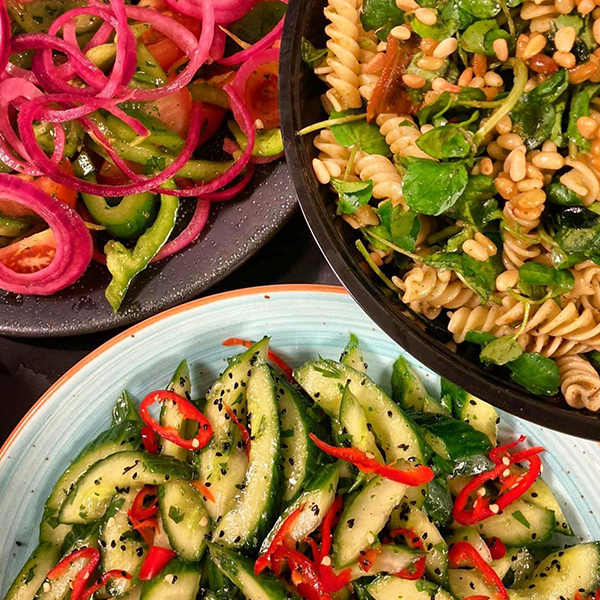
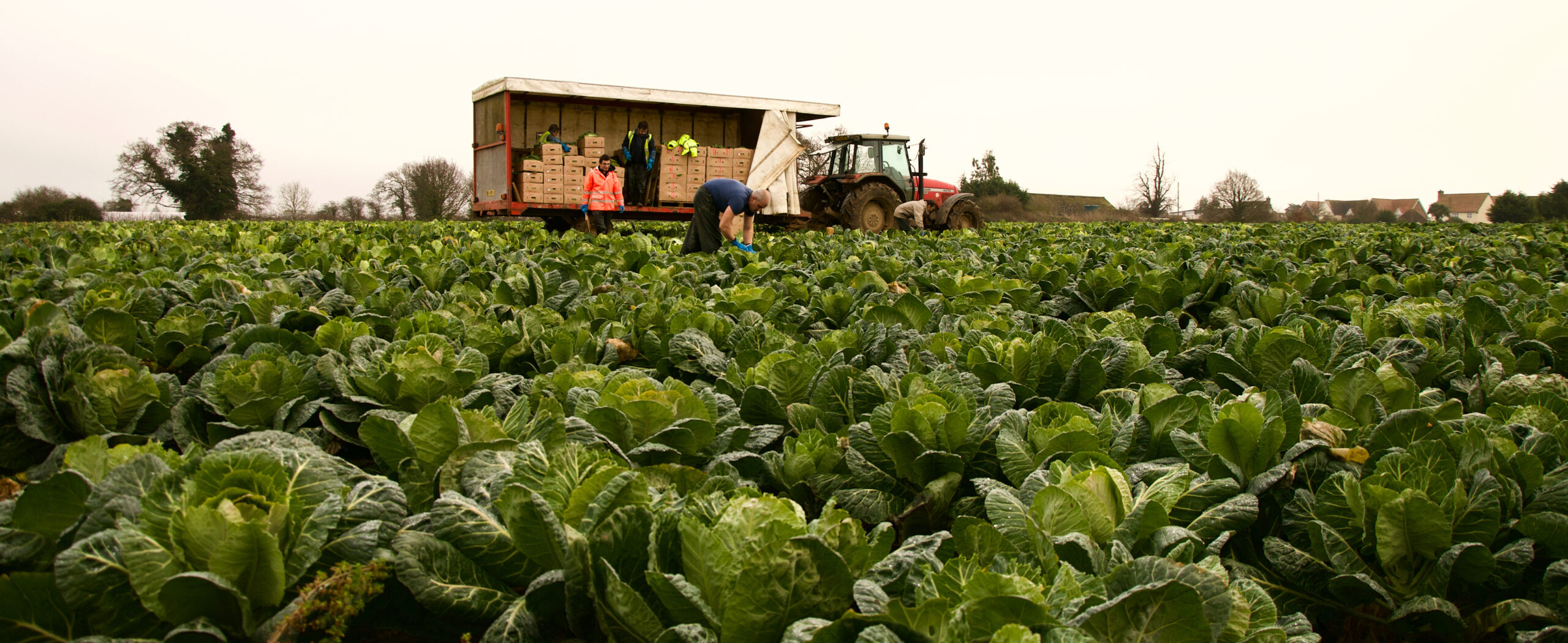
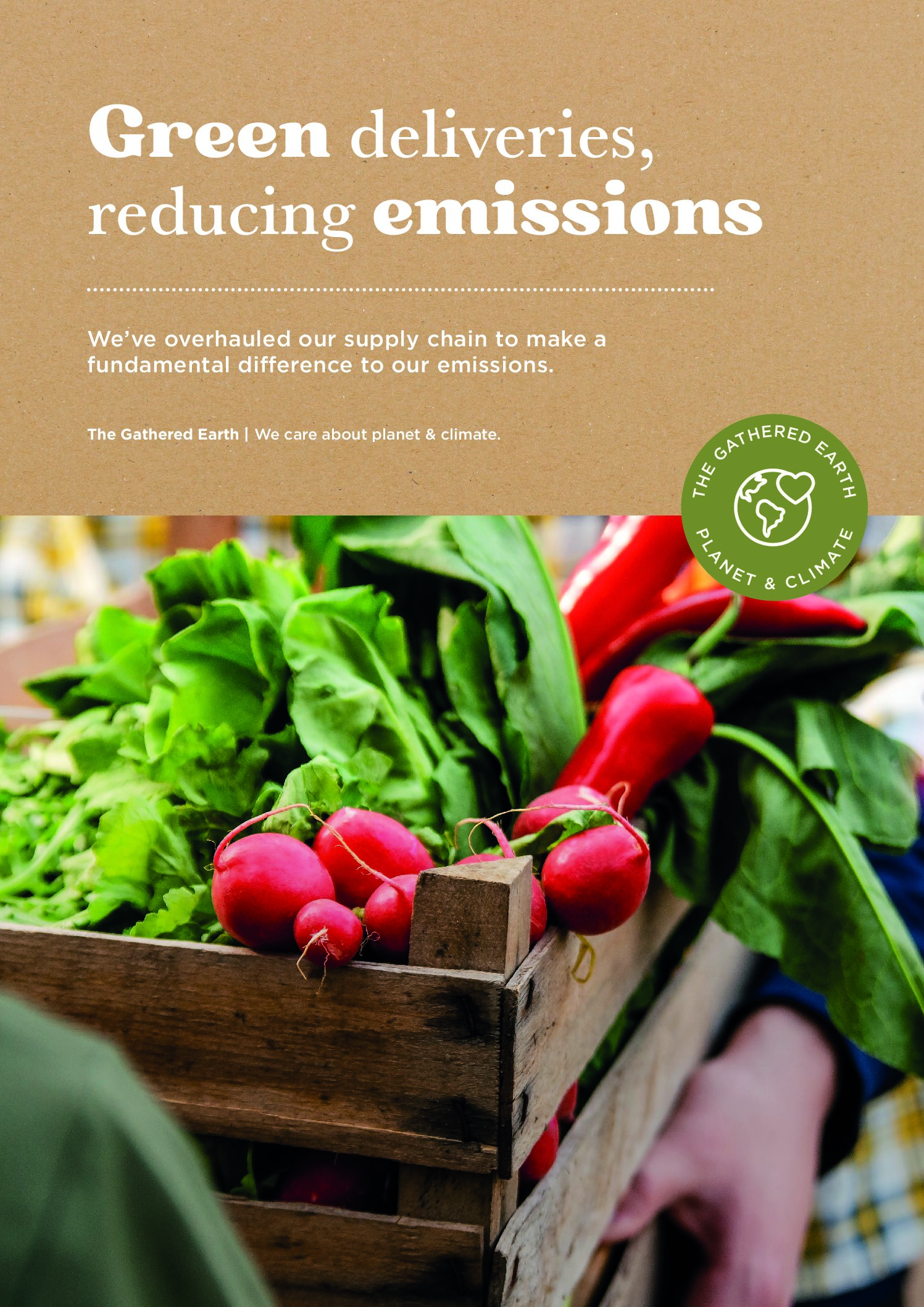
We’re Greening our Supply Chain
A large part of a food businesses’ environmental impact is found in their supply chain, as well as being a source of financial risk due to the instability of global supply chains (Garnett, 2020).
We’ve worked hard to reduce the impact of food-miles on the food we serve, all food we purchase comes in consolidated bi-weekly deliveries to reduce the number of times lorries drive to us. And on campus 100% of deliveries are on foot or from our Electric vans.
We align with certifications in order to ensure that the food we serve is ethically sourced, all meat on campus is certified Red Tractor, all the seafood we serve is rated ‘Good’ by the Marine Conservation Society and we try to avoid the big 5, all our eggs are certified free-range, and products that carry a high risk of human-exploitation are certified Fairtrade.
We choose to source products that are from small producers, social enterprises, British brands, or values driven businesses, often with sustainability missions. In 2022 93% of our ‘To-Go Lunch Range’ and our ‘Snacking & Soft Drinks Range’ were from small or micro businesses. 35% of our soft drink spend was on sustainability mission driven brands, such as Lemonaid, DASH water or Bottle Up.
We work with Waste Knot to rescue vegetables that are in danger of going to landfill due to aesthetic reasons, you can find Waste Knot vegetables in dishes in our refectories and we have our buffet salads in our Hospitality Brochure are made with Waste Knot vegetables.
Our menus are seasonal across campus, with termly audits of procurement to drive menu development, in 2022 83% of our fresh fruit & vegetable procurement was seasonal.
We Reduce, Re-use, Recycle Our Non-Food Waste
Recycling is often viewed as the solution to waste in the U.K., however, it’s not an activity that we are great at, in 2019 only 44% of recyclable materials were recycled in the U.K. (Gov.uk, 2019), recent geopolitical events have meant that our waste can no longer be exported, we need to reduce the sheer volume of waste that we produce (Statista, 2021).
We actively try to reduce the non-food waste associated with our operations. We re-use food packaging for storage containers, ensure that all non-food waste is segregated to increase recycling rates, and audit all new products to ensure that they are suitable for UCL waste streams.
Our Hospitality offer is disposable free by default.
We’ve worked with Sustainable Food Ambassadors to understand rates of contamination associated with our food packaging and have taken action to reduce contamination rates.
Read our Single-Use Plastic Reduction Action plan for 2022-23.
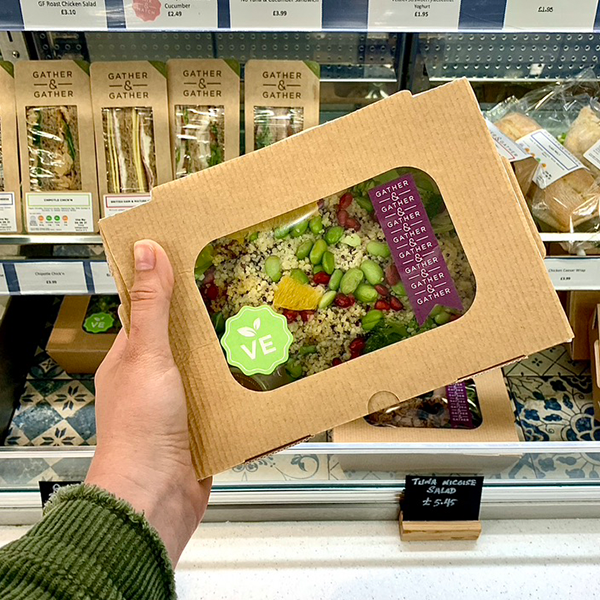
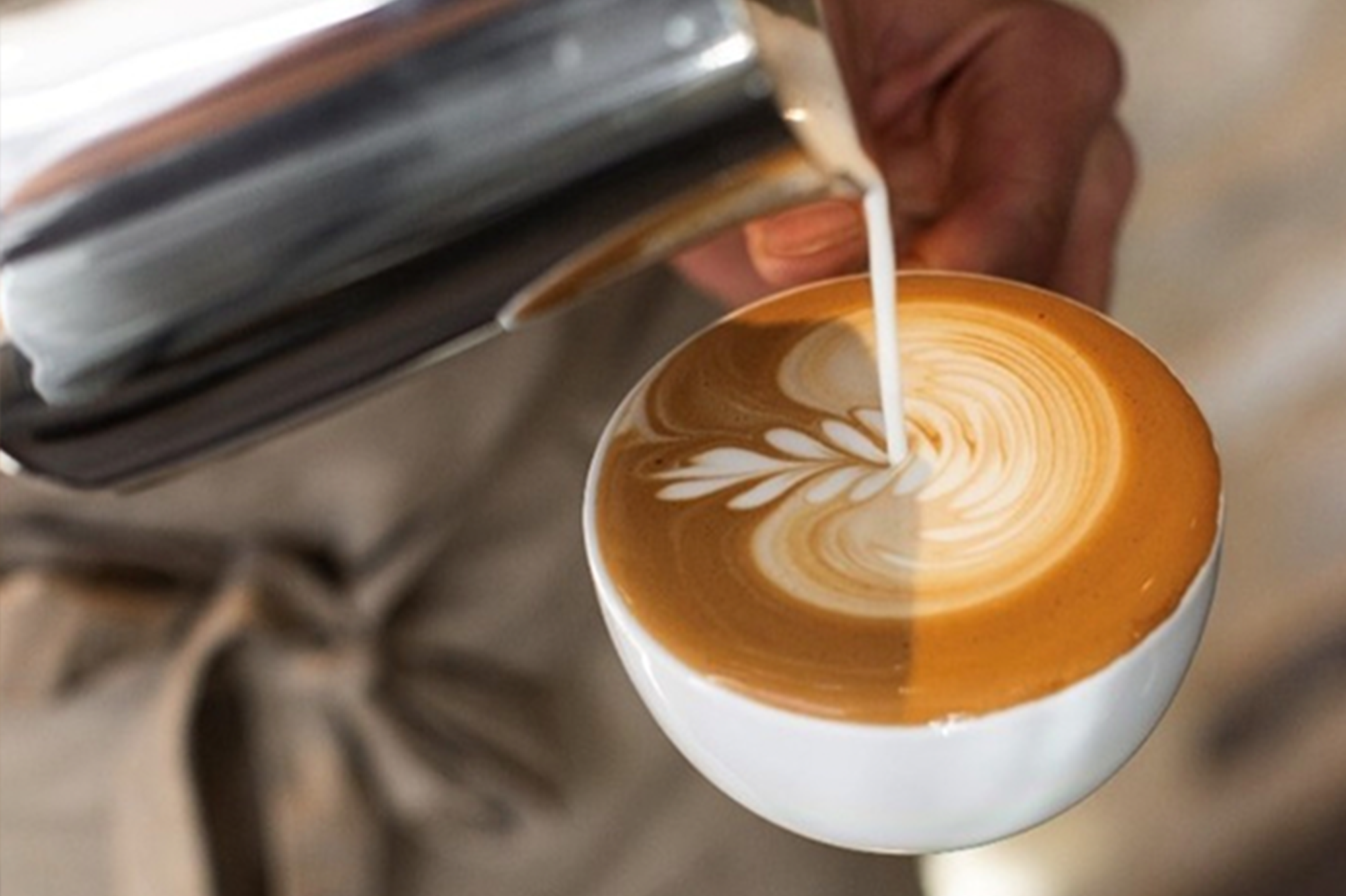
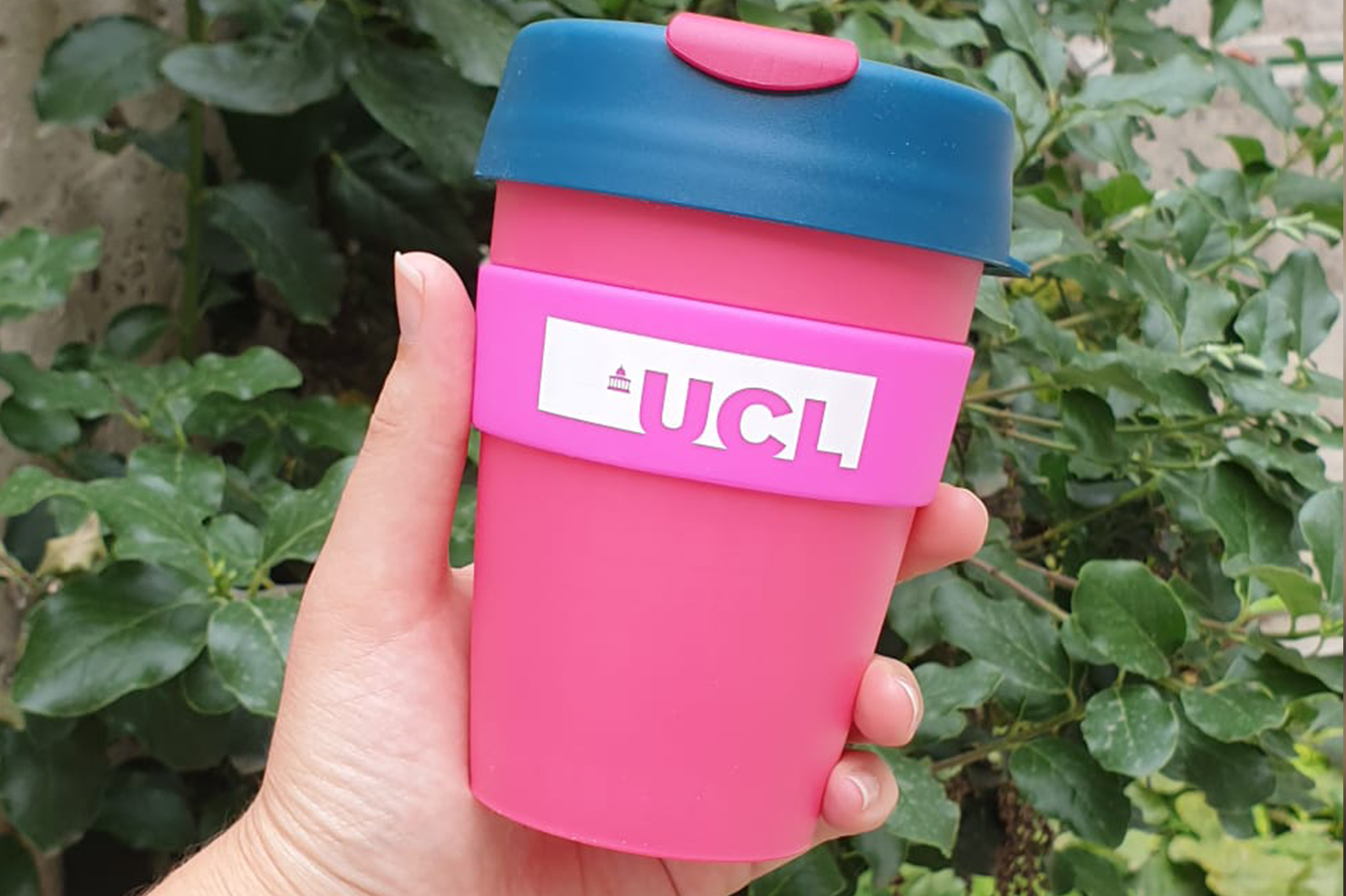
We Choose to Refuse: Saying No to Plastic
Plastic and food packaging waste is a core environmental issue, from the carbon impact of it’s production, to the carbon, and pollution impact of its disposal, plastic packaging is a key sustainability concern (Ellen MacArthur Foundation).
We audit our operations annually with support from Sustainable Food Ambassadors to identify our top 5 most used plastic items by weight, and then introduce interventions to reduce usage. So far we have removed clingfilm, plastic wrap, iced-coffee cups, and plastic disposable cutlery from campus.
Our top 5 items for 2023 will include milk bottles, hygiene gloves, disposable coffee cups & their lids, and allergen labels.
We engage with behavioural change research, UCL introduced a 25p disposable cup tax in 2020 in order to encourage the UCL community to switch to reusable coffee cups. This was then increased to 50p in 2023 which lead to a 20% reduction in disposible cup use. To support students, we offer a variety of alternatives to single-use lined disposables, with ceramic options in many cafes and a full range of UCL branded Keep Cups.
We are Open & Transparent
Don’t just take our word for it, we’ve been independently audited by third parties to assure that our actions are as good as our words.
Food Made Good
We undertake a biennual audit by the Sustainable Restaurant Association in order to achieve our Food Made Good Sustainability Rating. This is considered the Gold-Standard certification in the Hospitality sector, and assesses our operations, governance, and influence in sourcing, social impact & environmental impact. In 2021 we were awarded the top score, 3*, this was repeated in 2023 when we were awarded 3*’s again.
People & Planet
We worked with Sustainable UCL to complete the People & Planet Audit, scoring 100% for Sustainable Food.
Sustainable Food Working Group
We are a key member of UCL’s Sustainable Food Working Group working with UCL & the Student’s union to drive sustainable change across campus.
Reporting
Read our 2022 Annual Sustainability Impact report for our work at UCL
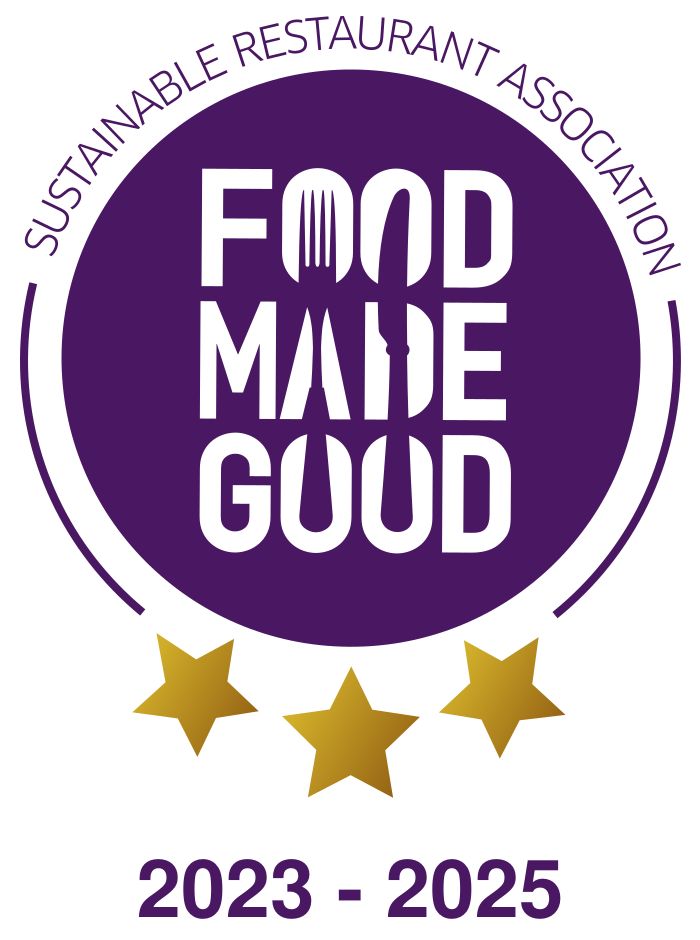
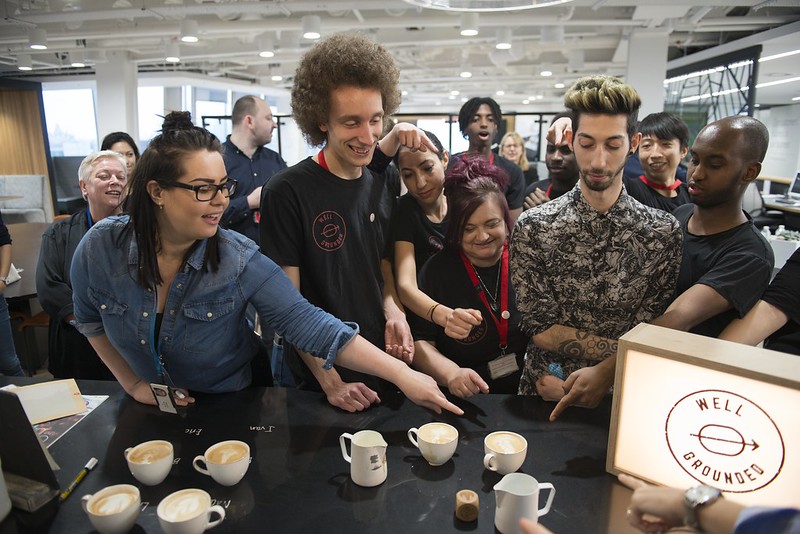
We Support the Local Community
As part of our responsible economic development strategy, we support local businesses and communities in order to promote economic sustainability (Ferguson and Thompson, 2020).
We donate our surplus sandwiches, sushi & salads to St Mungo’s Hostel & Life After Hummus in partnership with Zero Food Waste Society. Both of these charities are based in the Camden/Bloomsbury area.
Our Brew Bar in the Bartlett School of Architecture is staffed by Well Grounded, a Camden-based social enterprise that supports people into employment.
All our coffee is sourced from London-based roasteries and one of our most popular lunches in Hospitality is our London Larder Lunch, where we source ingredients and products from brands in Borough Market such as Nature’s Choice and Belazu.
We are developing a partnership between our Hospitality department and Camden-based Luminary Bakery, a social enterprise which supports women into baking-based roles, keep an eye out for their delicious cakes on campus.
Our Oat Milk is sourced from Minor Figures, a Camden-based company which uses British oats.
We Help You to Live Well
University can be a critical period to encourage healthy eating (Vadeoncoeur et al, 2016), non-communicable diseases related to diet and lifestyle are highly linked, and non-communicable diseases are the leading cause of death worldwide (Branca et al, 2019).
We use Future 50 ingredients wherever possible in our dishes. These are 50 ingredients identified by WWF as being better for people and planet promoting sustainable diets. Keep a look out for signage in the refectories to highlight when a dish contains a Future 50 ingredient.
When we add new products to our retail lines, we always look for healthier options to support a nutritional food environment. 40% of our procurement spend on ‘Snacks, Confectionary & Soft Drinks’ in 2022 was on healthy products.
We work with Rude Food Co Vending machines to supply a healthier vending experience for students and staff.
We label our refectory and café menus of food made-on-site with calorie information* to support students and staff looking for a lighter lunch.
*as per government legislation.
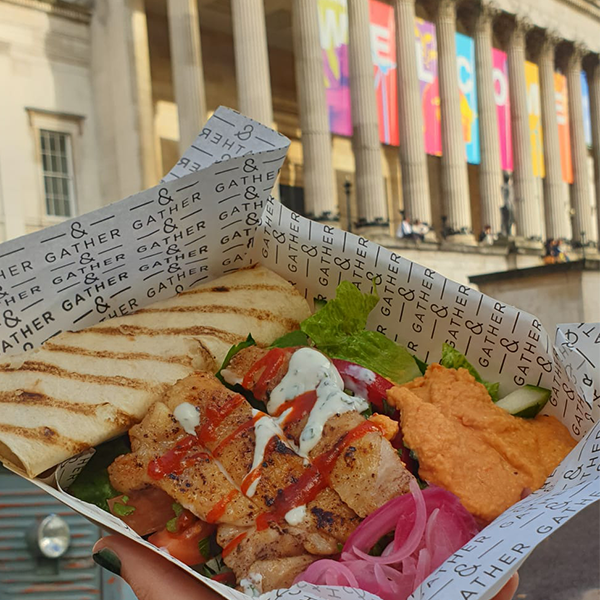
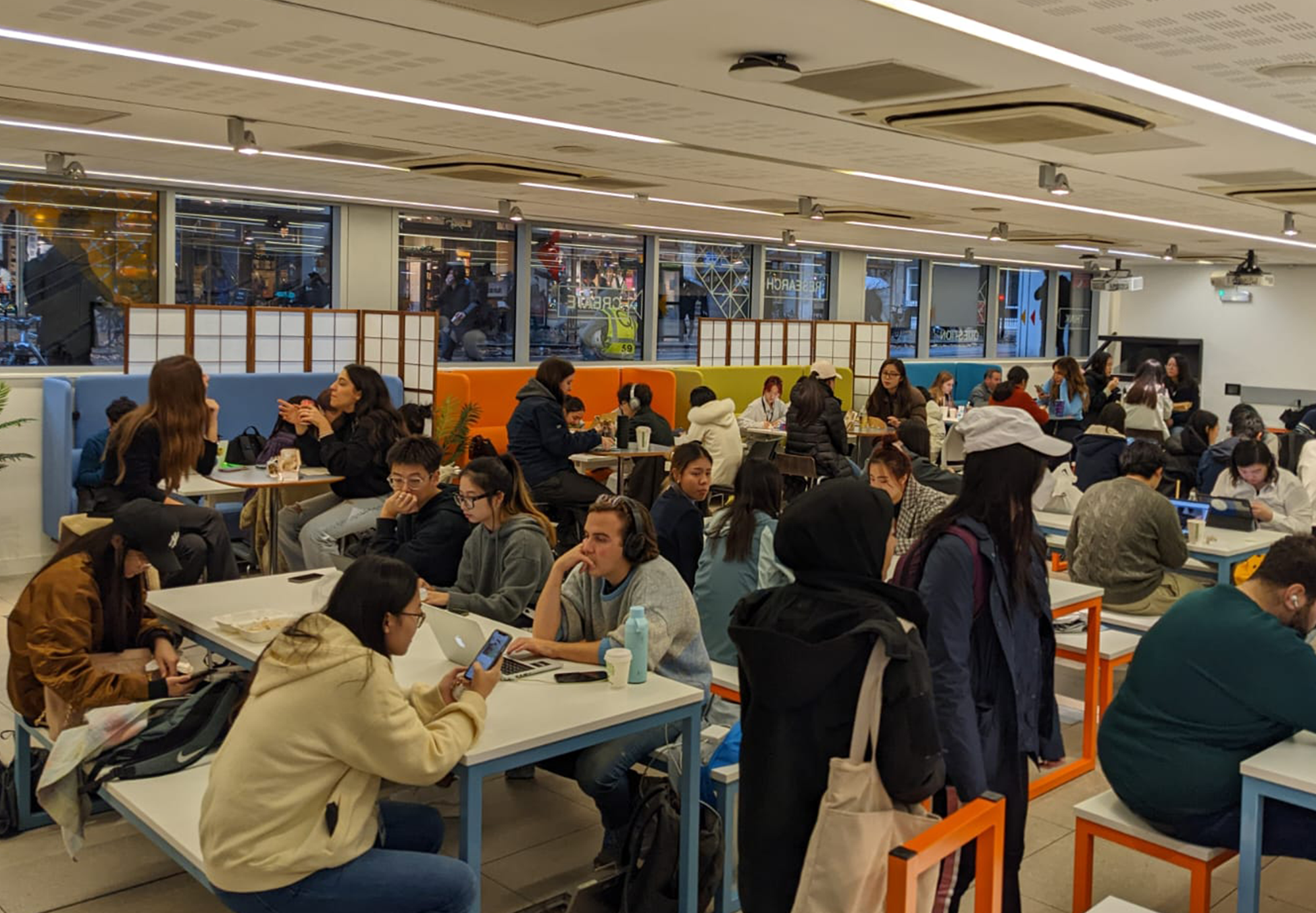
Our Kitchens are Living Labs
Every year we work with Student Food Ambassadors to undertake research projects. In 2022-23 we will work with these students on our single use plastic audit, a plate-waste behavioural change study, and a waste contamination audit.
We capture our data to ensure we make data-driven decisions working closely with Sustainable UCL to ensure that our actions have measurable impacts. In 2023 we undertook a Carbon Footprint research project to understand behavioural change and labelling.
Our kitchens & cafes are open to students and staff to conduct their research, please email Cicely to chat about your research area and how we can facilitate your study.
Interested in sustainability?
Meet Our Sustainability Manager
At UCL we take the sustainability of the food and drinks we offer very seriously, so seriously in fact that we have a dedicated sustainability manager, Cicely.
Cicely oversees our food and drink offering ensuring that we meet the standards set out in UCL’s Sustainable Food Policy . We strive for excellence, and continuously innovate to reduce our impact.
You can email her with any queries at
